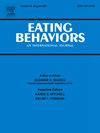Do impulse control difficulties moderate the relationship between intermittent fasting and disordered eating?
IF 2.4
3区 医学
Q2 PSYCHIATRY
引用次数: 0
Abstract
Background
Recent findings suggest positive associations between intermittent fasting (IF, i.e., an eating pattern that consists of alternating between consuming and abstaining calories over specified periods of time) and disordered eating (DE), including binge eating, laxative use, and self-induced vomiting. However, as not all individuals who engage in IF present with DE, the current study aimed to investigate whether 1) IF was associated with elevated DE, and 2) impulse control difficulties differentially predict DE in intermittent fasters compared to non-intermittent fasters.
Methods
Participants included 929 undergraduates (M = 19.8, SD = 2.97) from a university in the United States. IF was assessed with a single item question, “Do you intentionally engage in intermittent fasting in order to lose/maintain your weight or due to health-related motivations?” The Eating Disorder Examination Questionnaire was used to measure DE (i.e., global score, restraint, eating, shape, and weight concerns). One subscale from the Difficulties in Emotional Regulation Scale was used to measure impulse control difficulties. Hierarchal regressions examined whether impulse control difficulties moderated the relationship between IF and DE while controlling for age, gender, race, and ethnicity.
Results
IF was significantly associated with all DE outcomes. Adjusted analyses indicated that impulse control difficulties moderated the relationship between IF and two DE outcomes (i.e., global score (b = 0.038, se = 0.017, t = 2.17, p < 0.05) and restraint (b = 0.042, se = 0.019, t = 2.22, p < 0.05)).
Discussion
These results support previous literature that suggests an association between IF and elevated DE. Further, individuals engaging in IF with impulse control difficulties may experience more feelings of restraint towards eating and increased overall DE though effects were small. Future research delineating who is at highest risk for DE when engaging in IF is needed.
冲动控制障碍是否会缓和间歇性禁食与饮食失调之间的关系?
背景:最近的研究结果表明,间歇性禁食(IF,即在特定时间内交替摄入和禁食卡路里的饮食模式)与饮食紊乱(DE)(包括暴饮暴食、使用泻药和自我诱导性呕吐)之间存在正相关。然而,并不是所有进行间歇性禁食的人都会出现进食障碍,因此本研究旨在探讨:1)间歇性禁食是否与进食障碍的增加有关;2)与非间歇性禁食者相比,冲动控制困难对间歇性禁食者进食障碍的预测是否存在差异:参与者包括来自美国一所大学的 929 名本科生(中位数 = 19.8,标准差 = 2.97)。间歇性禁食通过一个单项问题进行评估:"您是否为了减轻/保持体重或出于与健康相关的动机而有意进行间歇性禁食?饮食失调检查问卷用于测量饮食失调(即总分、克制、饮食、体形和体重问题)。情绪调节困难量表的一个分量表用于测量冲动控制困难。在控制年龄、性别、种族和民族的情况下,分层回归检验了冲动控制困难是否调节了 IF 与 DE 之间的关系:结果:IF 与所有 DE 结果均有明显相关性。调整分析表明,冲动控制障碍调节了 IF 与两项 DE 结果(即总分(b = 0.038,se = 0.017,t = 2.17,p 讨论))之间的关系:这些结果支持了之前的文献,即 IF 与 DE 升高之间存在关联。此外,有冲动控制困难的中频食者可能会对进食有更多的克制感,并增加整体的进食量,尽管影响很小。今后需要开展研究,以确定哪些人在进行综合食物时摄入过多食物的风险最高。
本文章由计算机程序翻译,如有差异,请以英文原文为准。
求助全文
约1分钟内获得全文
求助全文
来源期刊

Eating behaviors
Multiple-
CiteScore
4.20
自引率
3.60%
发文量
65
审稿时长
60 days
期刊介绍:
Eating Behaviors is an international peer-reviewed scientific journal publishing human research on the etiology, prevention, and treatment of obesity, binge eating, and eating disorders in adults and children. Studies related to the promotion of healthy eating patterns to treat or prevent medical conditions (e.g., hypertension, diabetes mellitus, cancer) are also acceptable. Two types of manuscripts are encouraged: (1) Descriptive studies establishing functional relationships between eating behaviors and social, cognitive, environmental, attitudinal, emotional or biochemical factors; (2) Clinical outcome research evaluating the efficacy of prevention or treatment protocols.
 求助内容:
求助内容: 应助结果提醒方式:
应助结果提醒方式:


